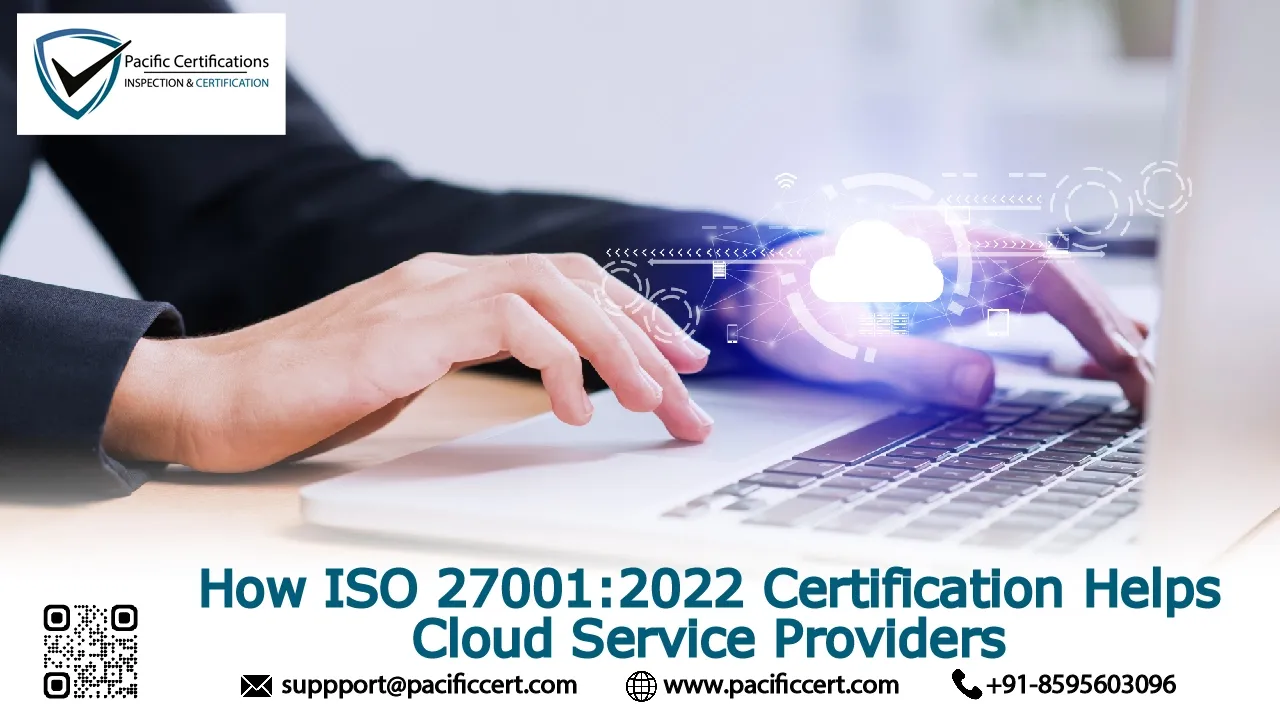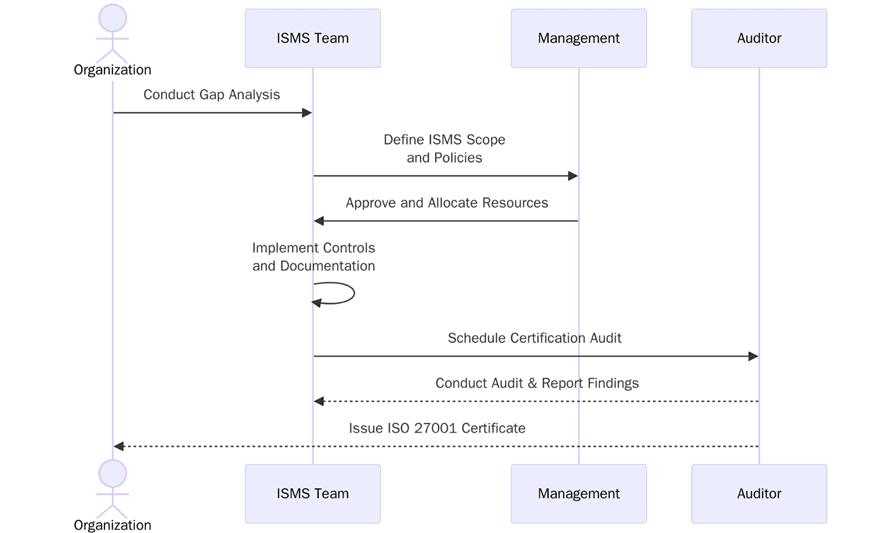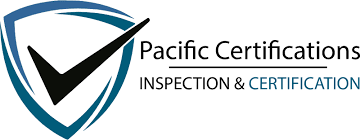How ISO 27001:2022 Certification Helps Cloud Service Providers?

Quick Summary
In this article, ISO 27001:2022 is presented as a globally recognized standard that helps cloud service providers (CSPs) develop and maintain a robust Information Security Management System (ISMS) to safeguard sensitive data, manage risks, and meet regulatory requirements. It highlights key updates like Annex A’s alignment with modern cloud, threat intelligence, and hybrid‑work environments. Benefits include enhanced data protection, strengthened trust with clients and regulators, better access to contracts and global markets, and improved resilience and accountability across operations. The article also outlines steps toward certification—risk assessments, control implementation, audits, and surveillance—and underscores how certification unlocks market opportunities in sectors increasingly demanding third‑party assurance.
Introduction
ISO 27001 is a globally accepted standard for Information Security Management Systems (ISMS). ISO certification assists organization's & cloud service providers (CSPs), develop, implement and maintain a full information security management system, and security posture to protect sensitive data, manage risks and meet regulatory requirements. Cloud service providers, which manage large amounts of customer data, can take advantage of ISO 27001:2022 certification framework by establishing a sound security posture when managing security risks while gaining trust from their customers.
In this blog, we will look into how ISO 27001 certification gives Cloud service providers an opportunity to upgrade their security posture, establish trust with their customers and comply with regulations.
How ISO 27001:2022 Certification Helps Cloud Service Providers?
Cloud service providers (CSPs) provide critical infrastructure, software, and platform services to many consumers including businesses, governments, and individual users. Consequently, CSPs are responsible for the security of a significant amount of sensitive and private data. Information security is of utmost importance to CSPs, as breaches and data leaks can result in substantial financial loss, reputational harm, and potential legal consequences.
ISO 27001:2022 certification allows CSPs to put in place all the processes required to undertake an all-encompassing information security management system (ISMS) to safeguard the confidentiality, integrity, and availability of consumers' data. Additionally, it is of considerable benefit for CSPs to also identify and address potential security risks, comply with legal and regulatory requirements, and improve competitive advantage in the market.
For more information, contact us at [email protected].
How ISO 27001:2022 certification benefits Cloud Service Providers?
Implementing ISO 27001 certification provides cloud service providers with several advantages, from improved data protection to better compliance management.

ISO 27001 requires organizations to identify and evaluate security risks and implement appropriate controls to reduce those risks. For cloud service providers, this is particularly important as they must ensure sensitive customer data is protected against cyber threats, unauthorized access and breaches, and they must demonstrate that their data is secure. ISO 27001 also requires regular review and updates of security controls, which allows cloud service providers to be proactive in protecting against new threats and vulnerabilities so they are much less likely to have security incidents and if they do, the impacts of those incidents will be minimal.
ISO 27001 certification is an effective way to build trust with customers as it demonstrates that a cloud service provider takes information security seriously. Cloud service providers are being entrusted with larger amounts of more sensitive data, causing customers to become concerned with the security of their information stored in the cloud. ISO 27001 helps cloud service providers to let customers know they can trust them with their data, as they know a third party has independently verified that the cloud service provider protects data to recognized security standards. This can make a huge difference in a competitive way, as customers are more likely to choose and trust cloud service providers who have ISO 27001 certification.
Cloud service providers are often subject to various data protection and privacy laws and regulations, including GDPR, HIPAA and others based on region or industry. ISO 27001 certification for cloud service providers helps them provide a structured approach to comply with data protection and privacy laws and regulations, for example they need to show they have identifying and protecting sensitive data and installing security controls around it to protect it. Having ISO 27001 certification, could help demonstrate to regulators that the cloud service provider is complying with the relevant privacy, and data protection laws/regulations but more importantly showing they have established commitment towards best practice for information security which potentially mitigates risk of non compliance fines and reputational harm.
ISO 27001:2022 requires organizations exhibit they have processes for incident management (incident identification, incident response & incident recovery). Since cloud service providers and third parties are inherently providing cloud services to organizations, they are targets for cyber-attacks or data breaches. ISO 27001:2022 mandates all cloud service providers have demonstrates appropriate incident response plan that allows cloud service providers to identify the security threat quickly and respond to threats quickly having less downtime and effect on incident. ISO 27001:2022 ensures that cloud service providers exhibit they have a recovery plan in place, in the event of a data breach that provides them the best opportunity to recover data and secured services back with the customer.
ISO 27001:2022 emphasizes continuous improvement, which is crucial for cloud service providers to stay resilient in the face of evolving security threats. The standard requires organizations to regularly audit their security practices, update risk assessments, and improve their ISMS to adapt to new challenges. For CSPs, this means that information security is not a one-time effort but an ongoing process that evolves with emerging risks, new technologies, and changing regulatory landscapes. The certification helps organizations maintain a proactive stance toward information security, ensuring that they are always improving and staying up-to-date with the latest security practices.
For more information, contact us at [email protected].
How to achieve ISO 27001:2022 Certification for Cloud Service Providers?
Achieving ISO 27001 certification involves several key steps:

1. Establish an Information Security Management System (ISMS): The first step is to define an ISMS that outlines the associated necessary processes, policies, and controls to ensure that sensitive information is protected.
2. Conduct a Risk Assessment: Identify and examine risks to information security, including risks to cloud infrastructure and customer data, and take steps to implement controls to minimize those risks.
3. Create Security Policies and Procedures: Create security policies and procedures that address the key aspects of data protection including access control, encryption, identification of significant incidents, and incident management procedures.
4. Implement controls and monitoring: Use appropriate security controls such as firewalls, encryption, and access restrictions and systematic processes for monitoring to ensure compliance with security policies.
5. Employee Awareness and Training: Take steps to ensure all employees are appropriately trained to recognize information security best practices, policies applicable to them, and their role in protecting data.
6. Internal audits and review: Regularly audit the effectiveness of your ISMS and identify all areas for improvement and track your progress towards compliance.
7. External audit and certification: Engage with an accredited certification body so they can complete an external audit of your ISMS. If your organisation meets the necessary requirements, you will be awarded ISO 27001 certification.
Contact Us
Pacific Certifications can assist your organization in navigating the ISO 27001 certification process. Our team of experts will help you establish an information security management system, ensure compliance with industry regulations, and improve your security posture.
For assistance, contact us at [email protected].
Visit our website at www.pacificcert.com.
Read more: Pacific Blogs

